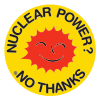Anti-nuclear movement in the Philippines
| Anti-nuclear movement |
|---|
 |
| By country |
| Lists |
The anti-nuclear movement in the Philippines aimed to stop the construction of nuclear power facilities and terminate the presence of American military bases, which were believed to house nuclear weapons on Philippine soil. Anti-nuclear demonstrations were led by groups such as the Nuclear-Free Philippines Coalition and No Nukes Philippines. A focal point for protests in the late 1970s and 1980s was the proposed Bataan Nuclear Power Plant, which was built but never operated. The project was criticized for being a potential threat to public health, especially since the plant was located in an earthquake zone.[1]
The demand of the anti-nuclear movement for the removal of military bases culminated in a 1991 Philippine Senate decision to stop extending the tenure of US facilities in the Philippines. Tons of toxic waste was left behind after the US withdrawal and anti-nuclear and other groups worked to provide assistance for the bases' cleanup.[1]
See also
References
- ^ a b Yok-shiu F. Lee; Alvin Y. So (1999). Asia's Environmental Movements: Comparative Perspectives. M.E. Sharpe. pp. 160–161. ISBN 978-1-56324-909-9.

